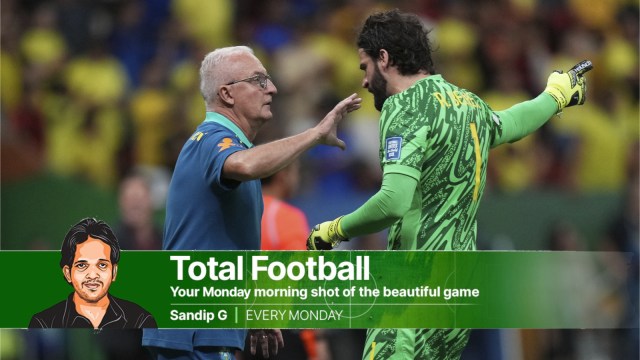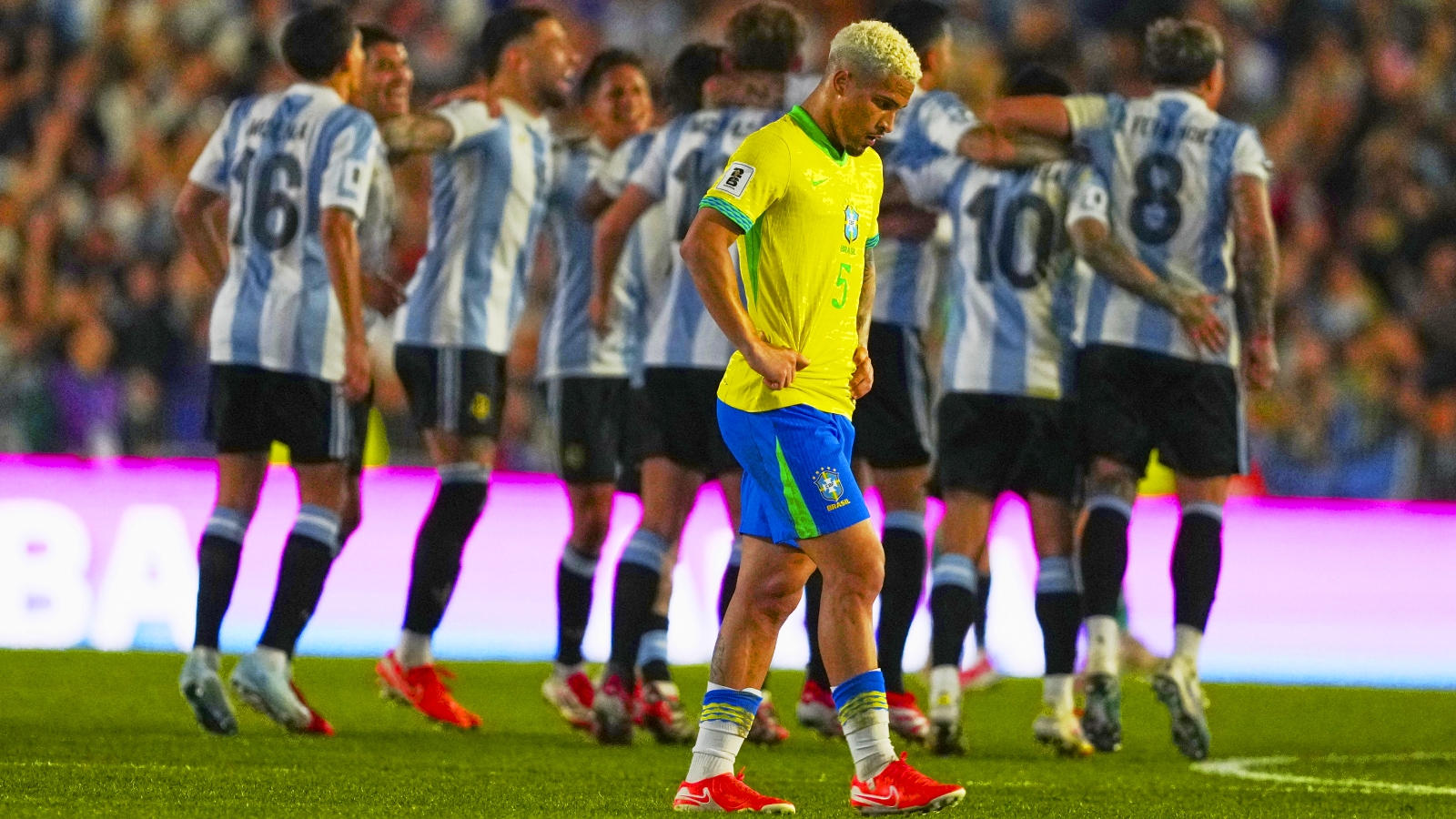Ronaldo says ‘foreign coach’, Rivaldo says ‘only home-grown’; the debate for Brazil’s national coach rages on
With three coaches changed in 15 months and none helping form a cohesive unit out of its many talents, Brazil's procrastination over embracing a European coach can only spell tragedy
 Brazil's coach Dorival Junior gives instructions to Brazil's goalkeeper Alisson during a FIFA World Cup 2026 qualifying soccer match against Colombia at Mane Garrincha stadium in Brasilia, Brazil, Thursday, March 20, 2025. (AP Photo)
Brazil's coach Dorival Junior gives instructions to Brazil's goalkeeper Alisson during a FIFA World Cup 2026 qualifying soccer match against Colombia at Mane Garrincha stadium in Brasilia, Brazil, Thursday, March 20, 2025. (AP Photo)The inevitable ouster of Dorival Junior, the third coach of Brazil’s beleaguering national football side in 15 months, has revived the old, nation-splitting debate. Whether to hire a foreign coach or not, a procrastination that has plunged them to recurring tragedies on the global stage, and now shaken them on the continental dais too.
The topic is as passionate as religion and politics in the country, perhaps even more because the sport is the greatest unifying force in the country. The foreign coach zealots argue about the country’s paucity of quality coaches (both in their own league and elsewhere). Amongst them is the legendary Ronaldo. “ I know I will get flak because I’m being ‘unpatriotic’ and I prefer foreigners. That is not it. We have to hire the best.” Waving the placard for domestically-raised coaches is his long-time strike partner Rivaldo. “The Seleção is ours and has to be managed by someone who has Brazilian blood running through his veins.”
Nothing perhaps captures Brazilian football’s delusional and self-destructive romance with their long-gone past than their resistance to hire a foreign manager. It’s symbolic of both their pride and vanity, their skepticism as much as the insecurity, of another colonial invasion that could wreck the soul of their football culture. A national team, after all, is a reflection of every element of that culture: the good and the bad, the strengths and the weaknesses. Not that a non-Brazilian coach is an utterly alien concept in the country. Uruguayan Ramón Platero (four games in 1925), Portugal’s Joreca (two friendlies against Uruguay in the 1940s) and Filpo Núñez (one exhibition game in 1965) have all managed them.
But none had them in a World Cup, and none had after they emerged as a powerhouse in the 1950s, as the country that embodies the beauty in the beautiful game. For decades, they remained resistant to the seductions of European football philosophies, be it to The Football or Tiki Taka. When Johan Cruyff ’s total footballers fluttered in football’s garden, Tele Santana created the most beautiful team to have never lifted the World Cup. They borrowed tactics—-and exchanged some of theirs too, in the ever-shrinking world. But the emphasis was to play football the Brazilian way—best described by the great Pele as “football as happiness, dance and a true party—even though it fell apart in a world where tactical systems reign supreme, when note-perfect orchestras consigned them to strumming hideous falsettos.
 Joao Gomes walks off after Brazil’s loss to Argentina in a World Cup 2026 qualifying soccer match at Monumental Stadium in Buenos Aires. (AP Photo)
Joao Gomes walks off after Brazil’s loss to Argentina in a World Cup 2026 qualifying soccer match at Monumental Stadium in Buenos Aires. (AP Photo)
The time to break from the past and turn their gaze towards Europe to hire their next coach has long arrived. Such an eventuality had been knocking on the doors for years. The success superiority of European coaches to the Brazil counterparts had been blatantly laid out by the hard facts that since winning the World Cup in 2002, Brazil have crashed out at the quarter-final hurdle in four of five editions, or as soon as they have met elite European adversaries.
The defeats exposed a deeper fault. Brazil could be the highest exporter of footballers to the top five leagues in Europe, its talent-mine could be bottomless, even its contemporary iteration has more quality and star power than most other national teams, but the country doesn’t churn out quality coaches as they do players. It’s a cruel paradox, but one that Brazilian football has to acknowledge to resurrect their glory days.
Historically, Brazil has not been a coach-producing country. Unlike their fierce rivals Argentina, the culture that had honed Cesar Luis Menotti, Marcelo Bielsa, Alejandro Sabella and Carlos Bilardo, the new wave of Diego Simeone, Mauricio Pochettino, Lionel Scaloni and Nestor Lorenzo. Seven of the 16 participating nations in last year’s COPA had an Argentine at their helm. Comparatively, only a handful of Brazilians had managed teams in Europe’s top five leagues. Most of them, needless to say, had forgettable times. The most famous one, Luiz Felipe Scolari, the last Brazilian coach to win a World Cup, had a humbling time with Chelsea in the 2008-09 season. As did Vanderlei Luxemburgo in Real Madrid in 2005, lasting barely a season.
Little surprise then that even most of the clubs in the country’s top league have sought the services of foreign coaches. Six of the top 10 clubs on the table previous season, including the first two, were helmed by either Argentine or Portuguese coaches. League champions in the last three seasons were managed by non-Brazilians.
Among the more successful ones were Dorival and his predecessor Fernando Diniz. Both of them looked horribly undercooked at the international level. Diniz endorsed a free-flowing brand, but his band looked disjointed and dispirited. Dorival promised more stability, but looked dazed at the sheer wealth of talent at his disposal to produce a coherent song out of them.
A casual scan of their resumes betray their shuddering lack of stripes to handle the most decorated country in the game. In the last 22 seasons, he has managed 26 teams; Diniz’s corresponding figures are 17 in 13. According to a study in a Mexican journal El Economista, a coach lasts merely 15 league days in Brazil. In comparison the boss lasts 42 in Spain, according to data collected from 2000 to 2022. It reflects the ridiculous impatience of the country’s premier clubs, their galling short-termism and inconsideration towards the time a manager requires to build a team or shape a coherent philosophy. To survive in such an environment, the coaches too become overburdened, restless, and invariably result-oriented.
The wanton ways of the clubs cannot be changed. Naturally, great coaches emerging from the country would be an aberration than the norm, though former Chelsea and Atletico Madrid man Felipe Luis is putting a strong case to emerge as an exception. The immediate fix, thus, is to embrace Europe, as Europe had, first for gold and the footballing treasures. Any procrastination could see the recurrence of heartbreaks and tragedies.
More Sports
Best of Express






























